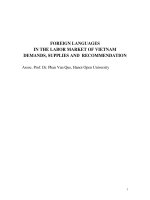foreign languages in the labor market of vietnam demands, supplies and recommendation
Bạn đang xem bản rút gọn của tài liệu. Xem và tải ngay bản đầy đủ của tài liệu tại đây (136.65 KB, 32 trang )
foreign languages
in the labor market of vietnam
demands, supplies and recommendation
Assoc. Prof. Dr. Phan Van Que, Hanoi Open University
1
introduction
Since 1986, with the open door policy, Vietnam has been integrating
successfully into the world community and at the same time into the world
market. Due to economic, political and social changes, there are definitely
new and growing linguistic needs and demands. The move from an
agricultural society to becoming a society where services are the dominant
activity, and the change toward a knowledge-based society, together with
increasing internationalisation leads to the need to have a careful and closer
look at foreign languages policies in connection with the labour market.
Establishing future training needs of the labour market in developing
countries is a difficult task that has faced manpower analysts and educational
planners elsewhere. There is no easy solution because no one can forecast the
future and, therefore, what labour demands are likely anymore than one can
future economic growth rates. However, there is always a body of facts,
evidence and experience available for policy makers, including foreign
language policy makers.
Foreign language policies thus are an integral part of a bigger task:
manpower planning. All foreign languages have to speak the language of
the market, that is the language of demand and supply. Manpower
planning is largely concerned with labour supply. Thus it is interested in such
questions as how many people are coming into the labour market, what are
their education and training levels etc. It is largely concerned in
determining what training needs there are so that the labour supply can
be shaped to meet the demands of the economy.
Manpower planning is also concerned with supply policies and, in
particular, implications for education and training. Inevitably, this has to
2
concentrate on education and training policies, among them foreign
languages policies.
This is a huge task, then it is not only confined to the Ministry of Labour or
Ministry of Education and Training, it is also concerned with human resource
planning in the Ministry of Planning or Ministry of Finance. It concerns the
whole society and it needs concerted actions.
Addressing the issue, this paper will first have a broad look at the
functions of foreign languages in the international market. Then it will
attempt to produce a look closer at the demand for foreign languages in the
context of Vietnam. After that, it will attempt to present the situation of
foreign languages learning and teaching in Vietnam and existing foreign
language policies. Finally and also most importantly, it will try to make some
recommendations concerning foreign language policies in a larger context
of manpower planning.
Foreign languages in the international market
In the international market, language skills, and intercultural skills
which come along with them, do not form a sector, but they are essential“
skills across all industrial or commercial activities ” (CILT, 2008).
Language and intercultural skills also form an important or an advantageous
component of the overall skills make-up of a wide range of occupations and
the language service industry adds value to all sectors. In this regard they are
cross-sector skills.
Employers worldwide see an increasing need for language skills, due to
globalization, business development and the need to be able to compete
effectively. It can be difficult to quantify the benefits of investing in language
skills, but most employers feel that it makes a positive difference to their
3
organization, whether they have use of those skills in the immediate
future or not (Mulatero, F & Riela, S, 2006).
Around the world, many businesses are now reviewing recruitment
procedures to bring in language skills when recruiting new staff. In some
businesses, language skills are ranked more highly than technical skills“ ”
(CILT, 2008). Retention is also an issue, and premiums are often paid for
language skills. When it comes to exporting to non English speaking
countries, the importance of language is readily accepted as crucial to
export success (Mulatero, F & Riela, S, 2006).
One important factor of the labor market is labour mobility. A barrier to
this is language. Living and working in another member state requires a
person to have at least a working knowledge of the local language for
successful integration into the local community. Take the European Union as
an example, in spite of an increasing number of EU citizens who are multi-
lingual, language is still one of the most significant barriers to labour“
mobility” (Shah, C & Long, M, 2007).
Realising this problem, EC (2006) confirms that early foreign-language“
acquisition is the forerunner to mobility ” and a labor force with“
practical language and intercultural skills enables European enterprises
to compete effectively in the global market-place.”
Here we come to another question: which foreign languages amidst
hundreds of languages in the global market? Undoubtedly, English has been
enjoying the lion share in the world market in general and in the
international labor market in particular, but many, including the native
English speaking countries now are realizing that "English is not enough"
(EC, 2007).
4
Surveys have demonstrated that UK business performs relatively
poorly compared to their European counterparts in respect of language
strategies, acquiring staff with language skills, employing external language
professionals … A range of such latent skills gaps and shortages in“
relation to foreign languages are interfering with business transactions
and leading to loss of business” (CILT, 2008). It was suggested that UK
organizations are losing their competitive edge, and often only operate in
English speaking nations due to the language barrier.
Another example of the importance of foreign languages can be seen in the
United States, the hot pot of different languages and cultures. The US State
Department in particular has a large demand for foreign language
ability. Annually, it provides more than 450 courses, including instruction
in 70 languages, to more than 50,000 employees from the Department,
over 40 other government agencies, and the U.S. military (State.gov).
Given the importance of foreign language in the labor market,
Recommendation of the European Parliament on key competences for lifelong
learning has identified communication in foreign languages as one of the
eight key competences and suggest that learning curricula should include“
the study of at least one foreign language of international use to prepare…
for international employment and multicultural working environments”
(EC, 2009).
Concerning education policy in terms of foreign languages, our discussion
also reveals what the 2004 APEC report calls the emerging regional
consensus that professional development of FL [foreign language]“
teachers is one of the most important and challenging issues that all
economies face ” (APEC, 2004).
5
In this context, we can not overlook the very local impact of language
policies on access to economic resources, to policy-making institutions,“
and to political power ” that Tollefson (1991, p.142) has described. In
transforming language use and language education into commodities for
a global marketplace, we have to take a particular stance with regard to
what Pennycook (1994) calls the cultural, political, social and economic“
implications of language programs. ”
Demands for foreign languages in the Vietnamese
labor market
As we know, in 1986, Vietnam started its doi moi policy to integrate into
the world community. As the country developed, the situation started
changing and foreign languages began to be more necessary. The situation in
Vietnam is more or less similar to those in many countries, especially in
the Asia Pacific region. A 2002 UNESCO report on curriculum changes
in the Asia Pacific region notes that: Facing the challenges of“
globalization trends, curriculum of countries in the region have paid
special attention to foreign languages, first and foremost it is English.”
(portal.unesco.org)
As English has become the most common medium for communication in a
global world, it is the language that provides job opportunities, access to
higher education and a broader flow of information, as well as facilitates
diplomatic discussions and business negotiations. Just the same, a focus on
the teaching of English language appears to have become institutionalized
in curriculum thinking throughout the Asia Pacific region, as, in most
language policy statements, the ability to speak English has been linked to
6
knowledge and skills necessary for economic competition, rendering it
as a type of human capital. “ ” (PIFS, 2004). English will become more
important as a means of internal cohesiveness and unity and external“
participation in the modern global community.” (PIFS, 2004).
Currently in Vietnam, up to 97.5% of students chose to learn English,
the total of students who choose to learn the other three languages
accounts for only less than 3% (moet.gov.vn). This situation in Vietnam is in
many ways similar to that in many parts of the world, including EU, where
90% of all pupils in secondary education choose to learn English (CEC, 2007).
One explanation for the fact is that English competency is a prime
qualification for those who wish to have better chances to study. A large
number of Vietnamese students have chosen to go to English-speaking
countries for their further studies. According to a report by the Institute of
International Education (iie.org), by the end of 2008, there were around
10,000 Vietnamese students in Australia, 8,000 in Britain, 6000 in
America. The numbers are increasing rapidly; for example, the number
of Vietnamese undergraduates and graduates who are pursuing their
studies in Australia has increased to 10,000 (vietnamnet.vn). Most of the
countries which receive Vietnamese students require these students have an
IELTS or a TOEFL score of a desirable level. In fact, according to statistics
of the IELTS agency, in 2007, Vietnam was among the 20 countries and
territories with the biggest number of students who sat at IELTS tests.
Another reason is economic development. Take tourism as an example: the
number of foreign visitors to Vietnam has been increasing rapidly, and the
international language for communication is naturally English. This leads to
the fact the Tourism Bureau of Vietnam has revealed: at present, 32% of
the labor force in the tourism industry can speak English while only 3.2%
7
speak some French and 3.6% speak some Chinese
(vietnamtourism.gov.vn).
However, other reasons and facts have recently made some other
languages more important than before. The learning of other languages is
no doubt of direct relevance to economic growth, competitiveness,
employability, external relations and foreign affairs; education and training;
higher education, science and research; culture; social rights; regional and
local development; tourism; among other things.
As we can see, on the one hand, English learning and teaching has
helped Vietnam in the new era of integration. On the other hand, the
learning and teaching of English at the expense of other languages is
posing serious issues.
We should first look at diplomatic relations. At the present time, Vietnam
has established diplomatic relations with almost all countries and territories.
To strengthen relationships, promote trade and cultural exchanges,
among other affairs, with countries other than English-speaking
countries, learning their languages is obviously necessary.
Tourism poses another set of problems. Vietnam is now becoming
known as one of the safest and most attractive for international tourists, many
do not come from English-speaking countries. It is of course advisable for
the Vietnamese government to improve the language picture in tourism.
Visitors to Vietnam are mainly from China, Taiwan, Korea, Japan, France,
Cambodia, Thailand, Malaysia (more than 100,000 visitors each), Germany,
Russia (around 50,000 visitors each). The number of visitors, especially from
traditional markets of Vietnam, where English is not an official language, has
been increasing year on year. In 2007, the number of tourists from France
increased by 42% (with 183,000 turns of people), from Germany by 32%,
8
from Sweden 60%, Finland 46%. The market of North-Eastern Asia, which
includes China, Japan, Korea and Taiwan, is still the most important, with the
visitors to Vietnam from these countries in 2007 totalling 1,200,000,
accounting for 30% of the total number for the year ((vietnamtourism.gov.vn).
To ensure a continuous and sustainable development of tourism, one of
the most urgent need for Vietnam is to improve language abilities of
tourism staff.
Another important aspect that should also be taken into consideration
is the rapid increase in the labor export. Since 2000, Vietnam has sent
70,000 workers abroad yearly. Most of them are working in countries where
English is not the mother tongue of the citizens or not an official language of
the state. At the present time, there are more than 400,000 Vietnamese
workers in 40 countries and territories. Malaysia, Taiwan, Korea and
Japan are among the biggest markets for the Vietnamese workers with
the total of Vietnamese currently working in these countries are 100,000,
90,000, 46,000 and 19,000 respectively. Another market of great potential for
the Vietnamese workers is the Middle-East. At present, the number of
Vietnamese workers in Qatar is 7000 and in UAE 3000. These numbers
will increase drastically along with the efforts of the Ministry of Labor, the
Injured and Social Affairs (Molisa) of Vietnam to expand these markets.
Molisa has signed an agreement with Qatar to send 100,000 Vietnamese
workers to this country in the period 2008-2010. Molisa is also negotiating
with other countries in the region such as Oman, Bahrain, and Libya. In the
world market, exporting labor is a type of exporting service with a special kind
of commodity, that is labor. The price for this commodity depends on many
factors, among them is the ability to communicate with the host people. As a
matter of fact, countries who accept Vietnamese laborers are now starting
9









